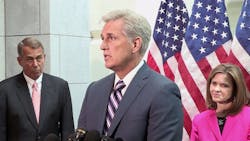Cautious hope for transportation funding, or more of the same?
Plenty of news has swarmed around House of Representatives Speaker John Boehner's (R-OH) pending — and seemingly abrupt — departure from Congress. What does it mean for the trucking industry and legislation that affects it?
According to Boehner, the resignation was planned and just came a bit sooner to avoid possible GOP infighting over harder-line Conservative stances some Republicans favor, particularly since that could detract from the party's chances as the 2016 presidential election heats up.
Ironically, Boehner's likeliest successor so far, House Majority Leader Kevin McCarthy (R-CA), hails from a state best known as a Democratic stronghold and has been judged by some groups such as the American Conservative Union to be more to the left than Boehner is. Still, Robert Poole, director of transportation policy at the Reason Foundation, says he believes the anticipated "revamped leadership under McCarthy will be more attuned to conservative, good-government principles."
The trucking industry will be watching for the vote slated for Oct. 8 to elect a new House speaker, whatever the outcome. "Until House Republicans choose their new leaders, it is difficult to speculate on what any potential impacts may be," notes American Trucking Assns. (ATA) spokesman Sean McNally. "ATA will continue to press forward on its priorities — including a long-term highway bill — regardless of who the caucus selects."
One thought that's floated around pundit circles is that Boehner may try to push through government spending authorizations like a surface transportation funding bill — perhaps even long-term legislation like the Senate passed over the summer — in his remaining weeks in an effort to clear the docket of such potential distractions.
Reason's Poole doesn't think that's likely. What he does expect in terms of transportation funding, he tells Fleet Owner, is "something more like MAP-21 — largely a continuation of the status quo for two or at most three years, to get past the presidential election — with the GOP hoping to go into 2017 with a Republican in the White House and GOP control still in both houses" of Congress.
"The more [Republicans] think this is at least a plausible outcome, the less likely they are to go for a long-term bill, especially one that is not actually funded," Poole adds, given Conservatives' demand for cost offsets for spending.
Washington transportation policy veteran Kenneth Orski, publisher of Innovation Briefs, agrees that the prospects for a longer-term surface transportation bill are uncertain — particularly because of funding uncertainty.
"While the Senate has managed to pass its version of a six-year bill — though only with enough funding for three years — the House Transportation and Infrastructure Committee is still waiting to hear from the Ways and Means Committee concerning funding of its proposed bill," Orski writes in an Oct. 1 update. Thus, Orski tells Fleet Owner, "Speaker Boehner's ability to move transportation legislation in his last weeks in office is entirely in the hands of Transportation and Infrastructure Committee Chairman Bill Shuster [R-PA] and Ways and Means Committee Chairman Paul Ryan [R-WI]."
The situation is likely to result in another extension of current highway funding legislation before any new bill passes muster, Orski notes: "Both House and Senate transportation spokesmen are now publicly conceding that this will not leave enough time for the two sides to come to an agreement on a multi-year bill by the end of October when the current extension expires. In other words, expect another temporary patch."
Even so, American Association of State Highway and Transportation Officials (AASHTO) newly elected President Paul Trombino III expects that the post-Boehner shakeup could bring with it some new energy for progress. "I think there is an opportunity provided when there is new leadership to take a fresh look at things," he says. "This Congress wants some wins on legislation, and with transportation they have an opportunity to do this."
"We think we can get a three-year funding bill at least," Trombino contends, which would pull transportation funding out of a continuous cycle of short-term patches. But the presidential election timeline could have a lot to do with congressional activity that occurs, he notes.
"I believe Congress will work on [a longer-term transportation funding bill] even if we do move into 2016. But the best time for us will be these last three months before we reach the presidential election year," Trombino says. "In many ways, we're already there — I'm in Iowa and we've already had every major candidate come through our state.
"It's already 2016 in a lot of ways out here."
About the Author
Aaron Marsh
Aaron Marsh is a former senior editor of FleetOwner, who wrote for the publication from 2015 to 2019.
